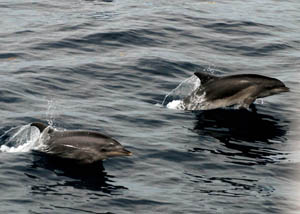 |
| Photo Credit: NOAA |
Clean Ocean Action continues
to monitor the investigation of recent dolphin deaths off the coast of the
Jersey Shore. Please read our blog
entries here and here from earlier this week and August 13, 2013
for more background information on the increase in dolphin deaths this summer.
In
a USA Today story dated
Tuesday, August 27, Todd Bates reported a total of 357 bottlenose dolphin deaths from early
July through Monday August 26, 2013 from New York to North Carolina, according
to federal officials.
NOAA has determined that 32
of 33 dolphins tested from all five states are either suspected or confirmed
positive for cetacean morbillivirus, a measles-like virus. For 11 samples, genetic
sequencing has confirmed this finding. Teri Rowles of the federal Marine Mammal
Health and Stranding Response Program notes that the outbreak may last into
next spring. She says there is also a
risk that the virus may be spreading to other marine mammal species, so
researchers are looking into other deaths over the last six months.
“Since July 9, 74 dead or
dying dolphins have washed up along New Jersey’s coastline. [Some] have been
confirmed with morbillivirus,”according to Bob Schoelkopf, the Marine Mammal
Stranding Center’s Executive Director. “[Others] have been tested for the
virus, with results of those tests pending,” he said.
Ongoing investigations
include the examination of other potential contributing factors, such as,
pathogen, biotoxins, changes in habitat, etc.
Rowles
added, “at this point, there isn't anything that we can do to stop the virus.
We don't have a vaccine that is developed that could be easily deployed in a
wild population of bottlenose dolphins or subpopulation of bottlenose dolphins
at this point.”
Today,
the Christie Administration directed additional state resources toward the
investigation of the bottlenose dolphin die-off. According to a NJDEP press release, “these steps include using Department of Environmental
Protection (DEP) aircraft and expanding patrols by DEP conservation officers.
The Administration is also providing the use of a Department of Agriculture lab
for testing, a move that will greatly help the nonprofit Marine Mammal
Stranding Center, on the front lines of responding to the deaths since early
July.”
According
to scientists, the 2013 dolphin die-off comes 25 years after over 740
bottlenose dolphins died along the coast from New Jersey to Florida from
1987-88. Morbillivirus was eventually
linked to their deaths as well (Reference: Lipscomb et al. 1994).
Clean
Ocean Action will continue to follow this story and provide up-to-date
information on the status of the investigation of the dolphin die-off in the
Atlantic.
For more information visit:
- What’s Causing the Bottlenose Dolphin Deaths Along the Mid-Atlantic?
- FAQs on the 2013 Bottlenose Dolphin UME in the Mid-Atlantic
- To learn more about Unusual Mortality Events click here
- To learn more about Morbillivirus click here
No comments:
Post a Comment